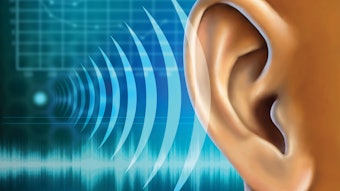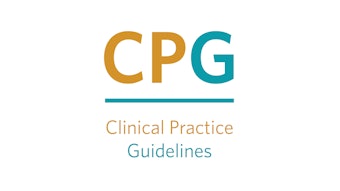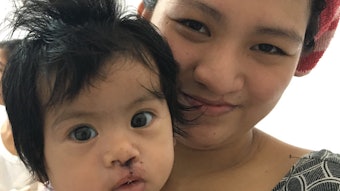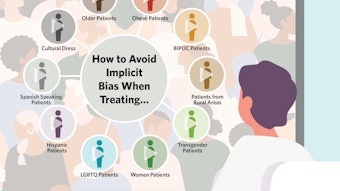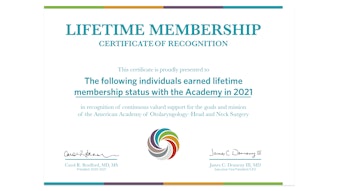Out of Committee: Geriatric Otolaryngology | Psychosocial Aspects of Balance Disorders in the Geriatric Population
Approximately one out of five elderly persons experiences problems with chronic dizziness, balance, or both.
Sean P. Holmes, MD, and Gauri Mankekar, MD, PhD, members of the AAO-HNS Geriatric Otolaryngology Committee
Jeff is a 67-year-old retired accountant who was relatively healthy until a year ago. He woke up one morning with lightheadedness and imbalance. He was evaluated at an urgent care facility after his symptoms continued to persist. Medical workup and imaging studies ruled out life-threatening causes of his symptoms. The medications prescribed to him were making him drowsy but did nothing to improve his confidence. With persistent symptoms, Jeff became anxious and fearful of falling. He was unable to continue his part-time job, drive, or even work in his garden.
Approximately one out of five elderly persons experiences problems with chronic dizziness, balance, or both.1 This has been attributed to several factors including age-related peripheral or central vestibular disease, cardiovascular disease, polypharmacy, vision or proprioceptive issues, cervical spondylosis, gait disorders, and psychiatric factors. Other causes that are commonly overlooked during the workup of dizzy elderly patients in the primary care and tertiary settings include cognitive decline and undiagnosed mental health conditions. Gait disorders have been reported in almost 60% of adults between 80 and 84 years of age and 25% of persons in the 70-to-74-year age group.1 Psychological disorders commonly contribute or influence older persons with dizziness although they may not primarily cause the dizziness.2 The psychosocial aspects of dizziness in the elderly require specific attention as we strive for mental and physical well-being for our patients of all ages.
Going for a walk in the fresh air or driving to a nearby park is a routine activity for a young healthy adult; however, it may be a complex task requiring a lot of planning for an elderly patient with chronic dizziness and imbalance. At least a third of the patients aged 65 and older reported difficulty walking three city blocks or climbing one flight of stairs.3 Additionally, mental, physical, and emotional age-related changes can be difficult to cope with for the elderly. An event such as the loss of a spouse or global pandemic, for example, would require a strong and intact coping mechanism to overcome such hardships. Coping skills are dependent on a variety of physical and mental factors, not limited to the ability to move around or drive a vehicle safely.
Tinetti et al. studied a sample of community-living adults 72 years of age and older. Of the study population, 24% reported chronic dizziness.4 Over a one-year follow-up, chronic dizziness was associated with risk of falling, worsening of depressive symptoms, decline in social activities, and self-rated health. Interestingly, the study results did not show any association of chronic dizziness with mortality, hospitalization due to any cause, or changes in activities of daily living. The authors, therefore, recommended that goals of care in the elderly should be redirected from simply identifying and treating individual diseases to alleviating the associated psychological, social, and physical disability.4 Dizziness, imbalance, anxiety, fear of falling, and thoughts of losing independence can become a vicious loop for these patients. The fear of falling can alter people’s gait, head movement, attention, and influence the initiation of the vestibulo-ocular reflex, all of which promote gaze stability.5,6 This can negatively impact motor and postural control. A fear of falling in the elderly has been linked to an increase in depression, anxiety, confusion, and feelings of helplessness. These factors limit the ability of elderly patients to empower themselves and persevere through treatment, as well as limit desire for social outings and decrease comfort in social settings. This may worsen the underlying causes of the dizziness by promoting further isolation.
In addition to management of the cause of the chronic dizziness or balance disorder, individualized exercise-based therapy to improve physical conditioning, gait, and strength can help to avoid the dizziness-anxiety-fear loop. Assistance from occupational and physical therapy is inherent to global improvement of elderly patients with dizziness. Conditioning of the vestibular system, developing motivation and confidence with walking and moving, and fall prevention are all key to the psychosocial improvement of our patients. A multimodal team-based approach to treatment of patients with vestibular rehabilitation and adjunctive cognitive behavioral therapy should be considered when planning a patient-specific treatment regimen.
References:
1. Verghese J, LeValley A, Hall CB, Katz MJ, Ambrose AF, Lipton RB. Epidemiology of gait disorders in community-residing older adults. J Am Geriatr Soc. 2006;54(2):255-261. doi: 10.1111/j.1532-5415.2005.00580.x. PMID: 16460376; PMCID: PMC1403740.
2. Sloane PD, Hartman M, Mitchell CM. Psychological factors associated with chronic dizziness in patients aged 60 and older. J Am Geriatr Soc. 1994;42(8):847-852. doi: 10.1111/j.1532-5415.1994.tb06556.x. PMID: 8046194.
3. Bloem BR, Gussekloo J, Lagaay AM, Remarque EJ, Haan J, Westendorp RG. Idiopathic senile gait disorders are signs of subclinical disease. J Am Geriatr Soc. 2000;48(9):1098-1101. doi: 10.1111/j.1532-5415.2000.tb04786.x. PMID: 10983910.
4. Tinetti ME, Williams CS, Gill TM. Health, functional and psychological outcomes among older persons with chronic dizziness. J Am Geriatr Soc. 2015;48(4):417-421. https://doi.org/10.1111/j.1532-5415.2000.tb04700.x
5. Young WR, Williams AM. How fear of falling can increase fall-risk in older adults: Applying psychological theory to practical observations. Gait & Posture. 2015;41(1):7-12.
6. Dieterich M, Staab JP. Functional dizziness: from phobic postural vertigo and chronic subjective dizziness to persistent postural-perceptual dizziness. Curr Opin Neurol. 2017;30(1):107-113. doi: 10.1097/WCO.0000000000000417
